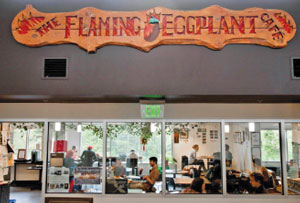Sustainable food a priority at area universities
By Helen Vaskevitch
This article was originally published in April 2012

When picturing the local food movement, many see small tables at Saturday farmer’s markets. It can be hard to imagine how a university dining hall fits into this picture, but institutional food is a big piece of the pie.
Seattle University (SU) and the Evergreen State College are two Washington schools that showcase the creative ways that the ivory tower is stepping into the local food movement.
Social change often originates with students. If you were to eat at any of SU’s dining halls, you would see what I mean. Yes, you’ll find pizza and burgers, the age-old subsistence foods of students everywhere, but those veggies on your pizza are from a local farm, and that burger is hormone-free beef. If you were to come in on a “low-carbon diet day,” you’d be offered a turkey burger as an alternative to beef.
SU’s dining halls are served by Bon Appétit Management Company (BAMCO), based in Palo Alto. BAMCO’s clients include Amazon.com and the Gates Foundation, but its main customer base is universities. The company’s hallmark is fresh, from-scratch cooking. In the past 10 years it has refined its menus to focus on local and organic ingredients in service to its mission of “food service for a sustainable future.”
Buzz Hofford, food service director for Bon Appétit at SU (and former PCC board trustee), recognizes the impactful role of university food service. “We view our role not just as feeding the community members but also educating them on the issues … and the students really enjoy that. They’re at that point in their lives where they want to learn about the issues and they appreciate working with a company that really walks the talk.”
Beyond the dining hall
Sustainable food is a hot topic at Evergreen as well. But on this campus, the change is taking place outside the dining halls.
Evergreen students have long been frustrated with the revolving door of institutional food corporations who have contracted at their college — most seem never to have heard the word “sustainable.” So several years ago, students took food service into their own hands.
For years, Evergreen students have been lobbying for Evergreen dining services to become self-operated. When the latest contract was awarded to Aramark, students got creative with their protests.
For months, Students Organizing for Food Autonomy (SOFA) put on weekly potlucks in the center of campus with hundreds of students attending. SOFA member Cris Papaiacovou saw the events as a way of saying, “Look how we can take care of our needs — we don’t need this corporation.” Potluck food embodied the students’ values: healthy and made from scratch with fresh, organic ingredients.
Meanwhile, behind the scenes, plans were a-cookin’. Papaiacovou and other SOFA members created a business plan for a student-run café. After much organizing, lobbying and many meetings, the plans for a renovated Campus Activities Building included space for the new co-op, to be called The Flaming Eggplant.
After a two-year trial run out of a trailer on the main campus square, in 2010 The Flaming Eggplant moved into its new permanent location. Students running the café are excited about the autonomy they now have over where they source their food. Students eating at the café are pleased with the high-quality, fresh-cooked fare that meets their values. Lines at lunch hour are
out the door.
It’s projected that this year the café will break even. Kate Savkovich, the café’s outreach coordinator, has big dreams for the little space. “One of my goals for the year is to make the space more of a community space where student groups or educational events can all happen,” she says. “We’re really trying to make it a space for elevation of artists and activists and the whole campus community.”
The sustainable food movement has found an eager springboard at universities across the country. As Hofford sees it, universities are “able to impact change just because of our volume, and also because of the education.” At universities, institutional food is being put back into the context of the local communities it serves, and change is happening on a truly inspirational scale.
If you want to learn more about organizations helping to bring sustainable food to college campuses, check out The Cooperative Food Empowerment Directive at www.cofed.org, or The Real Food Challenge at www.realfoodchallenge.org.
Helen Vaskevitch is a writer living in Ashland, Ore.
